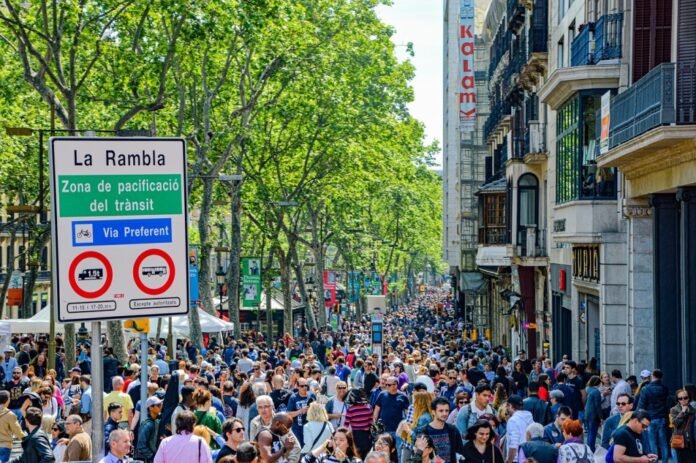
Barcelona, Spain’s most frequented city, continues to adjust its tourist tax structure as part of its strategy to manage overtourism and Barcelona, Spain’s most visited and culturally rich destination, continues to refine its tourist tax policies as part of an ambitious strategy to transform its tourism landscape. The Catalan capital, which welcomes over 32 million visitors annually, has implemented a series of strategic tax increases throughout 2024, with additional changes planned for 2025. These measures represent one of Europe’s most comprehensive approaches to managing overtourism while preserving the city’s unique character and quality of life for residents.
The Evolution of Barcelona’s Tourist Tax System
Historical Context and Development
Barcelona’s tourist tax system has undergone dramatic transformation since its initial implementation. The city’s approach represents a carefully calibrated response to the challenges of mass tourism that have affected many European destinations. What began as a modest levy has evolved into a sophisticated pricing mechanism designed to influence visitor behavior and generate substantial municipal revenue.
The tax structure reflects Barcelona’s position as one of the world’s most sought-after urban destinations, attracting visitors drawn to its architectural marvels, including Gaudí’s masterpieces, vibrant neighborhoods like the Gothic Quarter and El Born, world-class museums, and renowned culinary scene. However, this popularity has created significant challenges, including overcrowding in popular areas, strain on public infrastructure, and tensions between tourism revenue and resident quality of life.
Timeline of Recent Changes
The progression of Barcelona’s tourist tax rates tells the story of the city’s evolving approach to tourism management:
2023 Baseline: €1.75 per person per night for city tax April 2024: Increase to €3.25 per night (85% increase over one year) October 2024: Further increase to €4 per night (additional 23% increase) 2025 and Beyond: Approved cap increase to €8 per night, allowing for future adjustments
This trajectory represents a 128% increase from 2023 to current rates, signaling Barcelona’s commitment to using economic levers to shape its tourism industry.
Current Tax Structure: Comprehensive Breakdown
Barcelona City Tax (October 2024 Rates)
The current Barcelona city tax stands at €4 per person per night, applicable to all visitors regardless of accommodation type. This tax applies to stays ranging from one to seven consecutive nights, ensuring that both short-term and extended visitors contribute to the city’s tourism infrastructure costs.
Key features of the city tax include:
- Universal application across all accommodation types
- Progressive structure that encourages shorter stays
- Revenue dedicated to tourism-related infrastructure and services
- Electronic payment systems integrated with most hotels and booking platforms
Catalonia Regional Tax: Accommodation-Based Pricing
The regional tax system employs a tiered structure based on accommodation quality and type, reflecting the principle that higher-end visitors should contribute proportionally more to regional tourism infrastructure:
Luxury and Five-Star Hotels: €3.50 per person per night
- Applies to establishments with premium amenities and services
- Reflects the higher infrastructure demands of luxury tourism
- Includes resort-style properties and boutique luxury accommodations
Four-Star Hotels: €1.70 per person per night
- Covers mid-to-upper range hotel accommodations
- Represents the majority of business and leisure hotel stays
- Balances accessibility with contribution requirements
Rental Properties and Vacation Accommodations: €2.25 per person per night
- Includes Airbnb, VRBO, and similar short-term rentals
- Covers privately owned apartments and vacation homes
- Recognizes the growing importance of alternative accommodations
Budget and Lower-Category Accommodations: Varying rates typically below €1.70
- Hostels, guesthouses, and budget hotels often fall into lower tax brackets
- Designed to maintain Barcelona’s accessibility for budget travelers
Cruise Tourism: Specialized Taxation
Barcelona’s status as a major Mediterranean cruise port has necessitated specialized tax structures for maritime visitors:
Half-Day Cruise Visits (up to 12 hours in port): €3 regional tax
- Applies to passengers who disembark but don’t stay overnight
- Covers day tours and brief city exploration
- Recognizes the concentrated impact of cruise tourism on city center areas
Extended Cruise Stays: €2 regional tax
- For passengers staying longer than 12 hours
- Often applies to cruise itineraries with overnight port stays
- Reflects extended use of city amenities and services
Apart from this, Barcelona port is planning to reduce cruise capacity by cutting the number of cruise terminals from seven to five by 2030.
Total Cost Analysis: What Visitors Actually Pay
Understanding the combined impact of city and regional taxes is crucial for accurate trip budgeting. Here’s a comprehensive breakdown of current costs:
Premium Accommodation (Five-Star Hotels)
- Combined nightly rate: €7.50 (€4 city + €3.50 regional)
- Three-night weekend: €22.50
- Week-long stay: €52.50
- Extended stay (14 nights): €105.00
This represents a significant expense for luxury travelers, with a family of four paying €210 for a week-long stay in premium accommodation.
Mid-Range Accommodation (Four-Star Hotels)
- Combined nightly rate: €5.70 (€4 city + €1.70 regional)
- Three-night weekend: €17.10
- Week-long stay: €39.90
- Extended stay (14 nights): €79.80
Vacation Rentals and Alternative Accommodations
- Combined nightly rate: €6.25 (€4 city + €2.25 regional)
- Three-night weekend: €18.75
- Week-long stay: €43.75
- Extended stay (14 nights): €87.50
Cruise Tourism Costs
- Half-day port visit: €7.00 (€4 city + €3 regional)
- Full-day shore excursion: €6.00 (€4 city + €2 regional)
Future Developments: 2025 and Beyond
Approved Changes and Policy Framework
Barcelona’s city council has approved significant expansions to the tourist tax framework, providing municipal authorities with greater flexibility to adjust rates based on tourism patterns, seasonal demand, and infrastructure needs.
Tax Cap Increase: The maximum allowable city tax will rise from €4 to €8 per night in 2025, doubling the potential taxation ceiling. This change provides city officials with unprecedented latitude to implement dynamic pricing strategies.
Seasonal Variations: City authorities are exploring seasonal tax adjustments, potentially implementing higher rates during peak tourism months (June through September) and lower rates during off-peak periods.
Accommodation-Specific Adjustments: Future iterations may include more granular categorization of accommodation types, potentially creating additional tax brackets for emerging accommodation categories like luxury short-term rentals and boutique properties.
Regional Tax Evolution
Catalonia’s regional government is simultaneously reviewing its tax structure, with potential changes including:
- Rate Adjustments: Possible increases across all accommodation categories to better reflect the true cost of tourism infrastructure
- New Categories: Introduction of specialized rates for emerging accommodation types
- Environmental Considerations: Potential integration of sustainability factors into tax calculations
Revenue Projections and Utilization
The enhanced tax structure is projected to generate over €120 million annually by 2025, representing a substantial increase from current levels. This revenue will fund:
- Infrastructure Improvements: Enhanced public transportation, pedestrian areas, and tourist information services
- Cultural Preservation: Conservation of historic sites and cultural attractions
- Resident Services: Improved municipal services in high-tourism neighborhoods
- Sustainability Initiatives: Environmental programs addressing tourism’s ecological impact
Strategic Context: Barcelona’s Tourism Management Philosophy
Quality Over Quantity Approach
Barcelona’s tax strategy reflects a fundamental shift in tourism policy, prioritizing quality experiences over visitor volume. This approach recognizes that sustainable tourism requires balancing economic benefits with social and environmental considerations.
The city’s leadership has articulated a vision of “tourism that enriches rather than overwhelms,” focusing on:
- Attracting visitors who contribute meaningfully to the local economy
- Encouraging longer stays with deeper cultural engagement
- Supporting local businesses and communities
- Preserving Barcelona’s authentic character and livability
Overtourism Management
With tourism levels returning to pre-pandemic peaks, Barcelona faces renewed challenges from overtourism. The tax system serves multiple functions in this context:
- Demand Management: Higher costs naturally reduce demand during peak periods
- Revenue Generation: Funds address tourism-related infrastructure strain
- Behavioral Influence: Pricing encourages visits during off-peak times and to less crowded areas
- Local Support: Revenue helps mitigate tourism’s impact on residential communities
International Precedents and Comparisons
Barcelona’s approach aligns with global trends in tourism taxation, though its rates are among the highest in Europe:
- Venice, Italy: Implements day-visitor taxes ranging from €3-10 depending on season
- Amsterdam, Netherlands: Charges €3 per person per night plus percentage of room rate
- Paris, France: Varies from €0.20-4.40 per night based on accommodation type
- Dubrovnik, Croatia: Seasonal rates from €1.35-2.70 per night
Barcelona’s system stands out for its comprehensive approach, combining city and regional taxes with specialized provisions for different visitor types.
Regional Spanish Context: Broader Tax Landscape
Balearic Islands Implementation
The Balearic Islands (Mallorca, Ibiza, Menorca, and Formentera) operate a sophisticated tourist tax system that provides insights into Barcelona’s potential future directions:
- Seasonal Variations: Rates vary significantly between high season (May-October) and low season
- Age Considerations: Visitors under 16 are exempt from taxes
- Rate Structure: Ranges from €1-4 per night based on accommodation type and season
- Revenue Utilization: Funds specifically support environmental conservation and sustainable tourism projects
Canary Islands Considerations
While the Canary Islands haven’t implemented tourist taxes, ongoing discussions suggest potential future adoption, influenced by successful models in Barcelona and the Balearics.
Andalusia and Other Regions
Various Spanish regions are monitoring Barcelona’s experience, with some considering similar measures for high-tourism destinations like Seville, Granada, and San Sebastián.
Practical Planning Guide for Visitors
Pre-Trip Budget Considerations
Effective trip planning now requires careful consideration of tax implications:
Family Travel: A family of four staying one week in mid-range accommodation will pay approximately €160 in combined taxes
Group Travel: Business or leisure groups should budget €5.70-7.50 per person per night for tax expenses
Extended Stays: Digital nomads and long-term visitors benefit from the seven-night tax cap
Accommodation Selection: Tax rates can significantly influence the relative value of different accommodation types
Payment Methods and Logistics
Most establishments have streamlined tax collection processes:
- Hotel Integration: Taxes typically added to final bills at checkout
- Vacation Rental Platforms: Many booking sites now include tax estimates
- Cash vs. Card: Most properties accept both payment methods for taxes
- Receipts and Documentation: Visitors should retain tax payment receipts for expense reporting
Strategic Travel Planning
Savvy travelers can optimize their Barcelona experience while managing tax costs:
Seasonal Considerations: Off-peak travel offers the same tax rates with potentially better value accommodation
Accommodation Mix: Combining different accommodation types can balance cost and experience
Length of Stay Optimization: The seven-night cap makes longer stays proportionally more economical
Regional Exploration: Using Barcelona as a base for exploring other Catalonian destinations maximizes tax value
Economic Impact and Industry Response
Tourism Industry Adaptation
Barcelona’s tourism industry has generally adapted well to the evolving tax structure, with many businesses incorporating taxes into their pricing strategies and marketing approaches.
Hotel Sector Response: Many properties have adjusted their pricing models to maintain competitiveness while absorbing tax impact Vacation Rental Market: The alternative accommodation sector has experienced some consolidation, with quality providers maintaining strong demand Tour Operator Adjustments: Travel companies increasingly emphasize value-added services to justify higher overall costs
Visitor Behavior Changes
Early data suggests that tax increases have influenced visitor patterns: Average Stay Duration: Slight increases in average stay length as visitors seek to maximize value Seasonal Distribution: Modest shifts toward shoulder season travel Accommodation Choices: Some migration toward four-star properties offering the lowest combined tax rates
Revenue Impact and Success Metrics
The tax system’s success is measured through multiple indicators: Revenue Generation: Consistent achievement of projected income targets Tourism Quality Metrics: Improvements in visitor satisfaction and local resident attitudes Infrastructure Enhancement: Visible improvements in tourism-related facilities and services
Looking Ahead: Future Considerations and Trends
Technological Integration
Barcelona is exploring advanced technological solutions for tax administration: Digital Payment Systems: Streamlined electronic collection and reporting Dynamic Pricing Platforms: Real-time rate adjustments based on demand and capacity Data Analytics: Sophisticated tracking of tourism patterns and tax impact
Sustainability Integration
Future tax structures may incorporate environmental considerations: Carbon Footprint Factors: Potential adjustments based on visitor transportation choices Accommodation Sustainability: Tax incentives for environmentally certified properties Activity-Based Pricing: Possible taxes on high-impact tourism activities
Policy Evolution
As Barcelona’s experience with tourism taxation matures, policy refinements are likely: Rate Optimization: Continuous adjustment based on effectiveness and economic impact Exemption Considerations: Potential special provisions for specific visitor categories Regional Coordination: Enhanced alignment with broader Catalonian and Spanish tourism policies
Conclusion: Navigating Barcelona’s New Tourism Landscape
Barcelona’s evolving tourist tax system represents a sophisticated approach to sustainable tourism management that balances economic opportunity with social responsibility. While the increasing tax burden requires careful consideration in trip planning, it also contributes to preserving and enhancing the very attractions that make Barcelona a world-class destination.
For visitors, understanding and budgeting for these taxes is now an essential part of Barcelona travel planning. The investment supports a city committed to maintaining its cultural authenticity, architectural treasures, and quality of life while continuing to welcome visitors from around the world.
As Barcelona continues to refine its approach, travelers can expect a destination that increasingly prioritizes quality experiences, sustainable practices, and meaningful cultural exchange. The tourist tax, while adding to trip costs, ultimately contributes to preserving Barcelona’s unique character for future generations of visitors and residents alike.
Whether you’re planning a romantic weekend getaway, a family vacation, or an extended cultural exploration, Barcelona remains one of Europe’s most rewarding destinations. By understanding and planning for the current tax structure, visitors can focus on experiencing the incredible art, architecture, cuisine, and culture that make Barcelona an unforgettable destination.















[…] Barcelona has already tried other ways to control tourism, including planning to ban short-term vacation rentals by 2029 to help with the housing shortage. […]
Comments are closed.